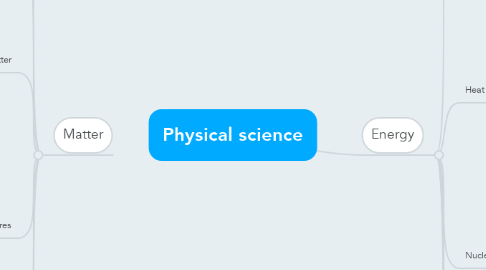
1. Energy
1.1. Waves
1.1.1. qualities of waves
1.1.1.1. trough
1.1.1.2. crest
1.1.1.3. wavelength
1.1.1.4. frequency
1.1.1.5. amplitude
1.1.1.6. period
1.1.1.7. wavespeed
1.1.2. EM Spectra
1.1.2.1. Radio waves
1.1.2.2. Micro-waves
1.1.2.3. Infrared
1.1.2.4. visible light
1.1.2.5. ultra violet
1.1.2.6. X-rays
1.1.2.7. gamma rays
1.1.3. Two groups of waves
1.1.3.1. Electromagnetic
1.1.3.2. Mecchanical
1.1.4. 2 types of waves
1.1.4.1. compression waves
1.1.4.1.1. rarefraction
1.1.4.1.2. compression
1.1.4.2. Transversal waves
1.2. Heat
1.2.1. Specific heat
1.2.2. melting point
1.2.3. boiling point
1.2.4. freezing point
1.2.5. absolute zero
1.2.6. Temperature
1.3. Nuclear energy
1.3.1. Radiation
1.3.1.1. Alpha
1.3.1.2. Beta
1.3.1.3. Gamma
1.3.2. Fusion
1.3.3. Fisson
1.4. energy transfers
1.4.1. Conduction
1.4.2. convection
1.4.3. radiation
1.5. Stars
1.5.1. Main seqence
1.5.2. life cycle
1.5.2.1. Nebula
1.5.2.2. stable state
1.5.2.3. red giant
1.5.2.4. red dwarf
1.5.2.5. white dwarf
1.5.2.6. supernova
1.5.2.7. black hole
1.6. Electricity
1.6.1. circuits
1.6.1.1. circuit diagrams
1.6.1.1.1. parallel
1.6.1.1.2. series
1.6.2. conductors
1.6.3. insulators
1.7. Kinetic energy
1.8. Gravitational potential energy
2. Matter
2.1. Atoms
2.1.1. Atomic number
2.1.2. Atomic Mass
2.1.3. Protons
2.1.4. Electrons
2.1.5. neutrons
2.1.6. bonding
2.1.6.1. covalent
2.1.6.2. ionic
2.2. measurments
2.2.1. meters
2.2.2. liters
2.2.3. Celcius
2.2.4. fahrenheit
2.3. States of Matter
2.3.1. Solid
2.3.2. liquid
2.3.3. gas
2.3.4. chemical properties
2.3.5. physical properties
2.4. mixtures
2.4.1. Heterogeneous
2.4.2. solvent
2.4.3. solutions
2.4.4. solute
2.4.5. colloid
2.4.6. Homogeneous
2.5. Law of conservation of matter
2.5.1. Synthesis
2.5.2. Decomposition
2.5.2.1. Reactants
2.6. scientific method
2.6.1. independent variable
2.6.2. dependent variable
2.6.3. Hypothesis
2.6.4. observations
2.6.5. conclusion
2.7. Conservation of matter
2.7.1. products
2.7.2. reactants
2.7.3. isotopes

